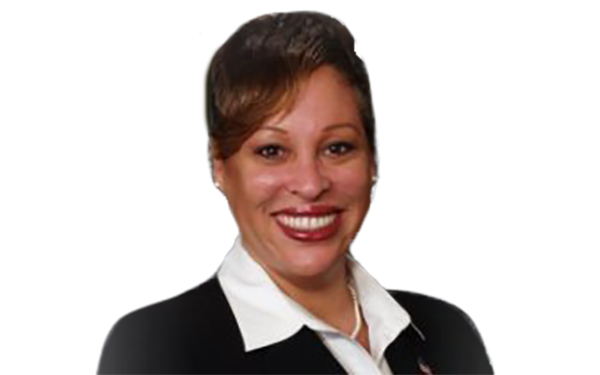On Leadership: Principal Pamela Chapman Is Using Grit, Grace, Data to Turn Around Her Detroit School

This is one in a three-part series The Seventy Four is publishing this week recognizing extraordinary school leaders to mark the end of National Principal’s Month. This Q&A has been edited for style and length.
From the United States Army Reserves to the frontline of one of Detroit’s toughest turnaround schools, Principal Pamela Chapman has been on a self-proclaimed journey towards authentic leadership. As a single mom in Washington D.C., Chapman resolved to become a teacher when she realized the education her young daughter was receiving was substandard at best. “I really began to understand the impact that one’s socioeconomic status has on the quality of education they receive,” she said.
Chapman was all in as she was promoted from teacher to instructional coach to assistant principal to principal, moving around the country as she established a track record of impressive student achievement gains. Her daughter recently graduated from college.
Chapman’s latest challenge: a mandate to turn around Brenda Scott Academy for Theatre Arts, a pre-K-8 school in Detroit, Michigan, a city mired in bankruptcy and long considered the epitome of urban blight. Chapman’s school, where she has been principal for nearly a year, is part of the Education Achievement Authority, a district that encompasses the state’s lowest-achieving schools. For the 872 students she serves, who come from some of the toughest circumstances around, she is their greatest hope.
“We’re at the bottom, I’m sure you know that,” she said. “So I decided to lean in.”
Your job is really hard. When you get up in the morning, and you wake up on the wrong side of the bed, what do you tell yourself to get up and ready?
So the irony here is I pushed my bed to one wall. I figured, let’s just lower the probability of getting up on the wrong side of the bed! When I look up my vision board is there. That’s the first thing that I see — my higher self. I have a picture of Frederick Douglass that says, “It is easier to build strong children than repair broken men.” Looking at that is a super quick reset. I say to myself, “God woke you up today, it’s another opportunity to succeed. How do you make that happen?” That is genuinely who I am. It’s about doing the work that helps children. Because if I don’t do it, who will?
Tell me about working in a turnaround school. Do you have a theory of change?
Turnaround work is hard. It varies from day to day. I tend to think of turnaround in a couple of ways. First is obviously the culture piece. It’s how I want children to feel when they enter the building. Our core values have to reflect the community. One of them is grit. Grit is necessary for my young people within the community I serve. That’s going to be the thing that gets them onto great high schools and to and through college.
Second is teachers, which are obviously the most important aspect of closing the achievement gap. When I think about teacher development and recruiting, I have what I call A squared: aptitude and attitude. Those are the two things that I look for when I’m looking for a teacher to come and serve our students. How open to feedback are they? Do they have a growth mindset? Are they able to identify their biases and check them at the door?
The last piece is the socioemotional piece. Particularly in the city of Detroit, I really feel like I have a high percentage of students that are suffering from post-traumatic stress disorder. And it’s literally coming from how they live everyday and what they experience.
What do you love about working in a school?
I love the act of teaching. I taught 7th grade social studies last week because the teacher was sick and I was like, “Yay, she’s sick, I can go teach!” (She laughs loudly) It’s been an uphill journey. A wonderful journey. I enjoy urban education. I enjoy working with teachers and students. It’s a moral imperative. It’s a social justice issue for me. I thoroughly enjoy when I make breakthroughs.
Do you consider yourself to be an entrepreneur? I ask this because turnaround cultures and start-up cultures share some of the same attributes. You have to be scrappy, creative, miraculous.
That is really interesting! For all of the things that I think about, that is not one of them. I love that though! You’re right, it is very similar to that. Everyday you’re taking what’s presented, doing a quick evaluation, and then laying out a plan. Data. How are we using what we’ve learned to adjust literally in the moment. Because that’s super important. And that’s the part about turnaround work that makes it different.
Was there a setback in your career that helped you become the leader you are today?
The relocation to Detroit from Florida. I came into the city with the expectation that, because I am here, you will take me at face value. I thought, my staff will do as I’m asking because I turn around schools, I move the needle. That’s what I do! And that was really not the case. There were a lot of questions around who am I as a person, why am I here. To me it felt like a setback because I’m so committed to the work. It was a struggle that people weren’t on Team Pam. Like, when did that happen? That was really hard because I had to go back to the space where you intentionally create buy-in and change a deeply entrenched, fixed mindset around an inner city school and what black children can do.
What have Detroit’s gifts been to you as you’ve gone from outsider to insider?
The gifts would have to be the people. There’s a ton of cultural capital that folks bring to the table. My students’ parents are awesome. Are they perfect? Absolutely not. But you know, their openness and willingness to be on this journey with me has truly been a gift.
Have you read Sheryl Sandberg’s book “Lean In”? What does “lean in” mean to you?
Yes, I have read the book. Huge fan. For me, “lean in”, leaning in, has been about pushing myself. If you’re going to tell other people that you can prove the possible in Detroit, you’ve gotta prove it within yourself. You have to be the example.
Coming here, I had no family in the area and I didn’t have any friends. I had no source of pulling from a leadership team that was existing. And I couldn’t convince anyone to come here with me, that is the honest to God truth. All of my resources were like, ‘No, we’re not doing Detroit. We draw the line at Detroit.’ And so even getting that feedback, I was like, ‘Pam, why would you?’
And then you know, I was like, “Lean in.” Why wouldn’t you? What’s the worst that could happen? You leave it how you found it. I doubt that’s going to happen.
Get stories like these delivered straight to your inbox. Sign up for The 74 Newsletter

;)
